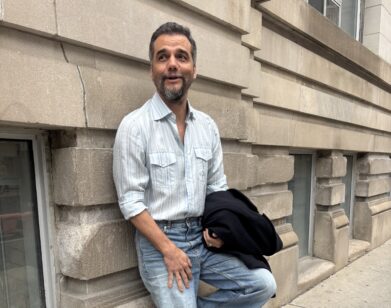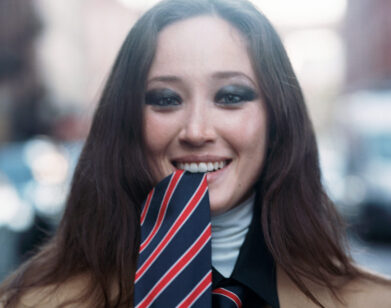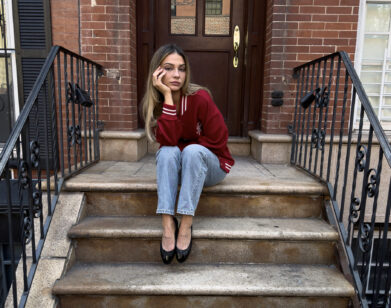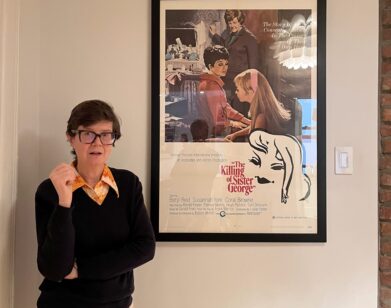Mia Hansen-Löve’s Adolescent Developments
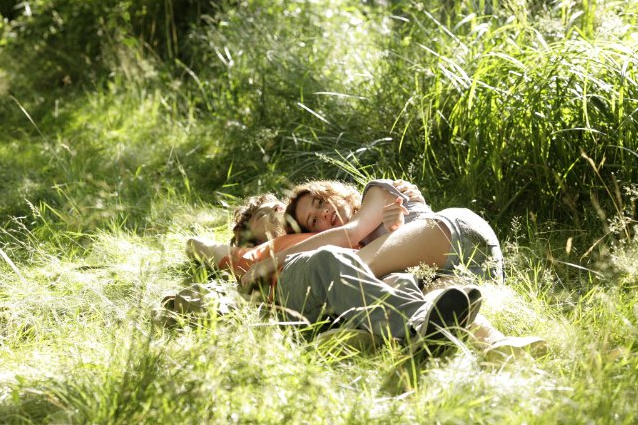
ABOVE: SEBASTIAN URZENDOWSKY AND LOLA CRÉTON IN MIA HANSEN-LØVE’S GOODBYE, FIRST LOVE.
Goodbye First Love, the quietly assured third feature from writer and director Mia Hansen-Løve, offers an evocative look at the ups and downs of adolescent romance. The film follows the relationship between Camille (Lola Créton) and Sullivan (Sebastian Urzendowsky) from their teenage years into their 20s, detailing the ways in which the characters hold on, let go, and use those early, intense memories of love to grow as human beings. Hansen-Løve treats the material with a level of respect and understanding unusual for adolescent subjects and is never heavy-handed—the film moves along effortlessly, like a gust of wind.
Interview spoke with Hansen-Løve about the importance of adolescence, the right and wrong way to use music, and her upcoming film about Daft Punk and the history of French house music.
CRAIG HUBERT: Why a film about first love?
MIA HANSEN-LØVE: I didn’t really decide to make a film about first love, actually. After the film was written, I realized it was a film about first love. It’s more that, after I finished Father of My Children, I had made these two films with strong relationships between father and daughter. When you finish a film, you ask yourself, what is the most important thing to do now? I went into that process and realized this thing that so strongly impacted me as an adolescent was a subject I had stayed away from—the relationship with the father had been a way for me to avoid the relationship in this film. I think all my films have things in common—love, grief—but this film is about physical love. I thought if I want to move forward, I have to try to confront myself with this subject matter.
HUBERT: You said you didn’t know the film you were writing until it was on the page. When sitting down to write, what do you start with?
HANSEN-LØVE: It has always to do with the passing of time. The films I’ve made, on the one hand, are portraits of people, of destinies. But these portraits are always connected to the passing of time. It’s movement, the story of a destiny. My first film was the destiny of a man, becoming the destiny of his daughter. My second film is also about that, a film producer and how his soul survives through his death. This one is about my own destiny. This film looks to me like a first film, even though I made it later.
HUBERT: I wanted to ask about Lola Créton, who is amazing in the film. What was it about her that made you think she was right for the role of Camille? I had only seen her in Catherine Breillat’s Bluebird (2009).
HANSEN-LØVE: I knew that I wanted somebody that was the same age as the character—in the beginning—and therefore could evoke the virginity and innocence that comes with that age. It wasn’t very important to me that she wouldn’t have the facial markings of someone who was older; I thought it was more important, in fact, and almost help to incarnate the internal qualities of someone who is older. At the time I started to look for an actress I just by chance saw Bluebird on TV—it wasn’t released in theaters in France. It’s funny because the reception to the film in the US was very good, but in France, no one saw the film in France because it was only on TV. I happened to be watching TV the day it was on, and from the first image… it’s hard to say. I was with Olivier [Assayas, her husband] and we both—and actually, Lola was just in his film, the one he was shooting in the summer—thought she was incredibly talented, she has a great simplicity. It’s not only that, but that is something that is very rare with young actresses. She never mimics. That was something that struck us from the moment we saw her in Bluebird. She has this innocence, a child-like thing in her face, but at the same time this incredible interior force. She’s tough, too, in a way. She has the mixture of purity, but at the same time she can play really tough characters. She’s not as soft as she looks. I think I used this wildness, in some way, in the film.
HUBERT: All three of your films focus on teenagers, or young people. What keeps you going back to this time in life?
HANSEN-LØVE: I think that’s why I keep saying these films form a trilogy, three portraits of teenagers. I never realized it before, though. When you talk to journalists, or film critics, it’s like a form of therapy. [laughs] You start to understand things about yourself you never thought about before. I really never realized I was making three films with adolescents. Today, I realized—obviously it was a crucial time in my life. For many people it’s a crucial moment to keep coming back to. It’s very intense. When I was an adolescent, I was very crazy about a boy, which is something that determined my life, in a way—for the ensuing years as well. Also, when I was 17, I was in a theater group in school—I wasn’t in the cinema -and through this group is how I ended up in Olivier’s films. The experience of being on the set, and mostly the experience of fiction, it’s very emancipating. It was really a turning point in my life. In fact, you know, I felt for years I was chasing it, to come back to it. Being in that movie, shooting that movie with him, was a magical experience. Eventually, I came back to it though the films I make now.
HUBERT: I wanted to talk a little bit about the importance of memory in your films. This film is about a relationship, but even more so about the memory of a relationship.
HANSEN-LØVE: Well, in fact, when I was an adolescent, I would constantly be telling my mother, this was the boy I was going to love my entire life, I would tell my friends as well, and they would laugh at me. That stayed very, very strong, and in fact that’s why memory is very important to me. The memory stays. It’s not out of nostalgia, but I feel it’s important that those feeling leave a trace, because that is what’s most important to me.
HUBERT: I wanted to ask about the music in your films. All your films use music in really interesting ways. In the past, you’ve used The Raincoats and The Modern Lovers to great effect. In this film, you use a song by Johnny Flynn.
HANSEN-LØVE: First of all, I have to say I’m often extremely shocked by the way music is used in films. I try to be tolerant, but it really puts me out of sorts, especially when it’s a film that I love. I often have a really strong reaction where I reject the music in films and I think that’s had an influence in how I respond to music. What I especially dislike is when music is used to amplify, to give moral support, to whatever is the action or emotion in the film, in a way that is artificial. Music is very profound, and very important, subject matter, and I think I was influenced by what Bresson wrote about music in his book [Notes on Cinematography]—Bresson was very radical, and I’m not, but every time I pick music I try not to use it in a manipulative way. Most of the time the music is music that the characters hear, it is part of the scene. It doesn’t come from the outside. It’s not something that’s injected in the film to make you feel something. Of course music evokes feelings, but to me, I try to do it so it’s justified. For the choices of music, I feel very free. So, for example, just because I’m French, I don’t have to use French songs.
HUBERT: The songs also don’t have to correspond to the period of the film.
HANSEN-LØVE: Right. I feel very free. I like to use music my characters would listen to in the film. It must belong to the character’s world. For me, the songs are a little bit like the casting of the film, I could talk about the choices for hours. The choice of every single song has a specific history. Johnny Flynn, I was crazy about his first album, and the second one was released when I was editing the film—I really love what he’s doing, I think he has a lot of grace. I heard the song, “The Water,” and was completely moved by the song but didn’t know what it was saying. I started to hear the words and realized it was incredible, as if it had been written for my film. The words were saying exactly what I was trying to say in my film.
HUBERT: It’s also a duet, which nicely corresponds with the film.
HANSEN-LØVE: Yes, exactly. That was also very moving. Johnny Flynn, he’s acting in Oliver’s next film as well. He has one scene, where he sings—it’s a period film, set in the 1970s—Phil Ochs. I can’t wait to see it. My next film is about music. It’s about house music, from the 1990s until today. It’s about young French DJ’s and the group around Daft Punk that became successful. So, yeah, music is very important to me.
HUBERT: So no more films about adolescence?
HANSEN-LØVE: I feel I’ve come to the end of it. It’s a page that can be turned.
GOODBYE, FIRST LOVE IS OUT TODAY IN LIMITED RELEASE.

